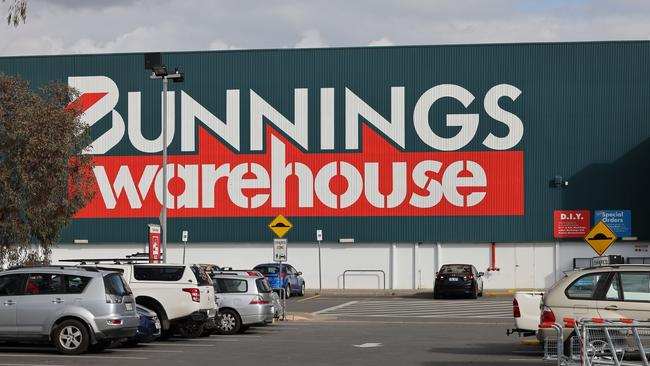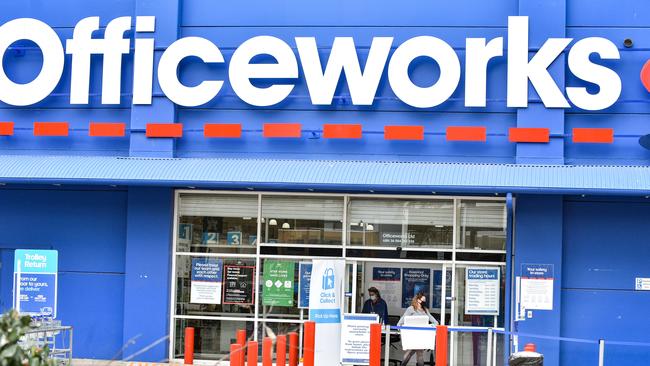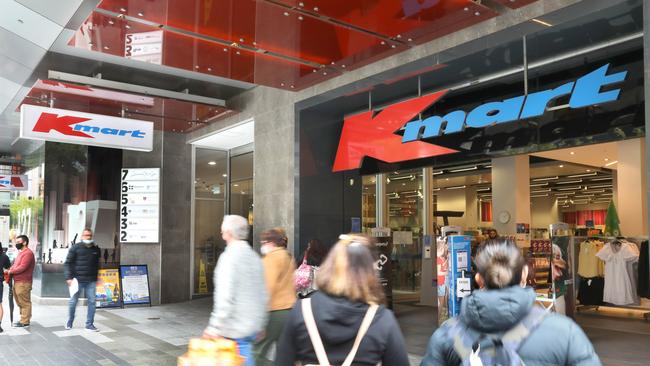Wesfarmers CEO Rob Scott slams ‘unnecessary’ right-to-disconnect law
The conglomerate’s CEO Rob Scott says the new IR legislation is ‘unnecessary’ and adds to the cost burden on business that ultimately feeds inflation.

Rob Scott – the managing director of Wesfarmers, one of the nation’s largest companies, which employs 120,000 people – has slammed new ‘‘right to disconnect’’ industrial relations changes as “totally unnecessary” and warned fresh state payroll taxes and complex regulations were hurting businesses and feeding an inflationary bubble.
Mr Scott said the right-to-disconnect rules that came into effect this week would not change the way Wesfarmers deals with its teams but it would need to spend money on a new layer of “compliance and oversight”.
“In terms of the really constructive relationship we have with our team, I don’t think it (right to disconnect) will see much change in how we deal with our team but the fact there are new regulations there, we need to put in place another level of compliance and oversight that frankly I see as totally unnecessary,” Mr Scott told The Australian.
“Quite frankly our team members care deeply about the success of our businesses and when you contact a team member out of hours, on the vast majority of occasions they are keen to help out. And if they are doing something else and can’t respond then we adopt a very common sense approach because we care about them and their down-time. There is a common sense way that we deal with that within our businesses. Under the new regulations we will just have to make sure we have people closely monitoring the rules to make sure we are not inadvertently tripping ourselves up.
“We now need to navigate through a far more prescriptive and complex regulatory setting.”
He said these new regulations, creeping compliance and oversight was a “handbrake on the economy”.

And in a stinging attack on the Albanese government’s industrial relations agenda, which some critics see as taking the nation’s workplace back to the 1970s, Mr Scott warned that the federal and state governments were saddling business with costs, taxes and regulatory burdens that would ultimately increase inflation.
“Whenever there are new regulations put in place it adds a cost. Sometimes new regulations are important and sometimes changes in regulations can be productive and constructive, but the changes we have seen in industrial relations from our point of view, all it does is add cost, complexity and reduce flexibility.”
The remarks were among the strongest criticisms of the federal government’s changes to industrial relations by a CEO in reporting season.
Unveiling Wesfarmers’s full-year results on Thursday, Mr Scott also criticised state governments that have increased taxes.
“Then you add up tens to hundreds of regulations and rules, and even including additional payroll tax we pay in Victoria and Queensland now, there are just all these additional rules, costs of business that are adding to the inflationary burden that we already have,” Mr Scott said.
Volatility within the economy coupled with a slowdown in housing construction and stretched household budgets were evident in the results, with investors particularly rattled by a flat growth trajectory at Bunnings, which is usually responsible for two-thirds of Wesfarmers’s profitability.
The hardware giant showed slowing growth exiting the second half and into the first eight weeks of fiscal 2025, with much of the blame cast on a slowdown in construction, and to some extent poor weather conditions.

Stablemate Kmart Group put in a stellar result to become the new high-growth division for Wesfarmers. There were better earnings at Officeworks and the newly created healthcare arm.
Wesfarmers shares fell 4 per cent to $74.06 amid concerns about the future growth prospects of Bunnings. However, the shares have rallied almost 30 per cent since January.
Struggling online marketplace Catch was again a blemish on the strong results, recording a loss of $96m, but this was an improvement on its $163m deficit in 2023.
Lower global commodity prices dented the WesCEF chemicals, energy and fertilisers arm, with a 16.9 per cent slide in revenue to $2.747bn as earnings dropped 34.2 per cent to $440m.
On Thursday Wesfarmers posted a 3.7 per cent lift in full-year profit to $2.557bn.
The Wesfarmers group posted revenue of $44.189bn, up 1.5 per cent, as earnings rose 3.3 per cent to $3.989bn.
Revenue was ahead of market expectations while net profit was in line with forecasts.
Wesfarmers declared a final dividend of $1.07 per share, up from $1.03, and payable on October 9.
Mr Scott said the growth in profit and cashflows highlighted the quality of the group’s portfolio of businesses and strength of execution in a challenging market environment.
“We expected a challenging year and there were numerous headwinds to navigate with cost of living pressures, rising costs of doing business, subdued activity in residential construction and significant volatility in key commodities,” Mr Scott said.
“In this environment, our divisions maintained their focus on profitable growth and shareholder returns by delivering more value, choice and reliability to our consumer and commercial customers.
“Wesfarmers’ businesses executed well, with the retail divisions responding effectively as households increasingly shifted to value during the year.
“Sales and earnings growth in the retail divisions was supported by everyday low price offerings and products with broad customer appeal.”
Sales at Bunnings rose 2.3 per cent to $18.968bn as earnings lifted 0.9 per cent to $2.251bn, although its return on capital from its 512 stores across its Bunnings, Tool Kit Depot and Beaumont Tiles banners was still high at 69.2 per cent.
Of more concern to investors was slowing growth into fiscal 2025, as analysts pointed to year to date sales growth that was positive but below the 2.9 per cent delivered in the second half of 2024.

Mr Scott said a weaker housing market was a drag on Bunnings’ performance, and also strongly pushed back against suggestions the hardware chain was now a mature business that was ex-growth.
“We at Wesfarmers are still very confident about the future growth prospects for Bunnings. There is still a lot of runway ahead for Bunnings.”
“I think the Bunnings result for 2024 was a fantastic result when you consider the headwinds you are seeing on the household side around household consumer spending, and particularly on commercial and construction side. Bunnings over the last eight weeks is still growing sales, slightly down on the stronger sales result for the second half of the year, and we specifically called out the softness in residential construction. Now we see that as a very much a cyclical issue and, to be honest, it is important not to overstate the importance of that.
“We still feel there is a lot of opportunity there. There are many categories where Bunnings would have low-single-digit market share, so there is still a lot of headroom.”
Kmart Group increased sales by 4.4 per cent to $11.1bn as earnings jumped 24.6 per cent to $958m, with its Anko private label brand driving sales and customer loyalty and now positioned as a potential global brand that other international retailers will want for their stores. For the first eight weeks of 2025 Kmart Group, which includes retailers Kmart and Target, delivered sales growth broadly in line with growth in the second half of 2024.
Officeworks sales were up 2.3 per cent to $3.434bn as earnings rose 4 per cent to $208m.
Revenue at the health division, which owns Priceline and the Silk Laser clinic business, rose 5.9 per cent to $5.624bn and earnings increased 11.1 per cent to $50m.






To join the conversation, please log in. Don't have an account? Register
Join the conversation, you are commenting as Logout